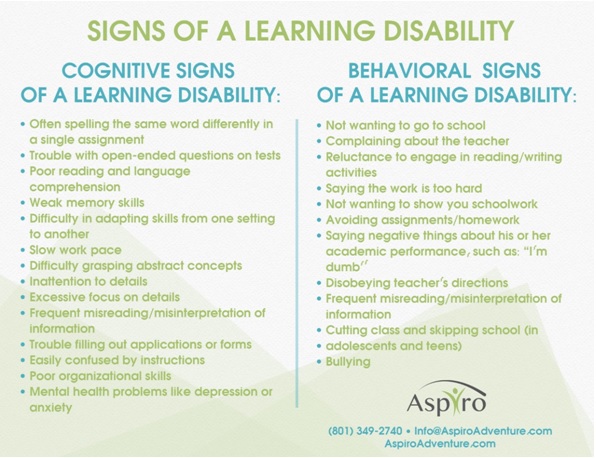
Research reveals that over 54% of special education kids suffer from at least one type of learning disability.
As special education teachers it might be challenging to figure out that a child has a learning disability. Additionally, some children might suffer from learning disabilities long before they are diagnosed. These children can have a hard time at school as their self-esteem is on the verge of breaking down and their motivation to succeed in life also crumbles. Thus, you as special education teachers as well as parents of special needs children must be aware of the symptoms of learning disorders. The sooner you detect the symptoms the better and easier it will be to teach children with special needs.
What Is A Learning Disability?
Learning disabilities are neurological disorders that affect the way people process, understand and use information. It happens when the brain does not take and process information the same way as it is supposed to. These disabilities can make it challenging for individuals to read, write, speak, understand mathematical concepts, and/or perform other essential tasks. Early detection of learning disabilities is crucial to ensure that children receive the support they need to succeed academically and socially.

People with learning disabilities have average or above-average intelligence and hence there is a gap between their expected cognitive skills based on their intelligence and how they do at school. The early signs of learning disabilities vary depending on the type of disability, and it is essential to note that these signs do not necessarily mean that a child has a learning disability. However, if you notice these signs consistently and they are impacting a child's academic performance, it may be time to consider an evaluation for a learning disability.
8 Common Early Signs In Learners With Learning Disabilities
Here are some of the early signs of learning disabilities to look out for:
1. Delayed Language Development
A child with a learning disability may exhibit delayed language development. This means that they may take longer to start speaking, or they may have difficulty communicating with others. If a child struggles to express themselves, cannot understand simple instructions, or has a limited vocabulary, it could be an early sign of a language-based learning disability.
2. Difficulty With Phonological Awareness
Phonological awareness refers to the ability to hear and manipulate sounds in language. Children with phonological awareness difficulties may have trouble identifying the sounds that makeup words or may have difficulty rhyming. This can be an early sign of a language-based learning disability, such as dyslexia.
3. Reading And Writing Struggles
Reading and writing difficulties are the most common signs of a learning disability. If a child is struggling to read, write, or spell, they may have dyslexia or another language-based learning disability. Some signs of reading or writing difficulty include difficulty recognizing letters or words, slow reading, spelling errors, and difficulty understanding written instructions.
4. Challenges With Math
Math is another area where children with learning disabilities may struggle. If a child has difficulty understanding basic mathematical concepts, such as addition, subtraction, multiplication, or division, or struggles to solve math problems, it may be a sign of a math-based learning disability, such as dyscalculia.
5. Poor Memory
Children with learning disabilities may have difficulty retaining and recalling information, which can impact their academic performance. If a child struggles to remember things, such as the days of the week, their phone number, or their address, it may be an early sign of a learning disability.
6. Organizing And Planning Issues
Organizing and planning are essential skills that help children stay on task and manage their time effectively. Children with learning disabilities may struggle with these skills, leading to disorganization and difficulty completing tasks. If a child has difficulty planning and organizing their day, homework, or tasks, it may be a sign of a learning disability.
7. Behavioral Problems
Children with learning disabilities may exhibit behavioral problems, such as being disruptive in class or having difficulty following rules. These behavioral problems can be an early sign of a learning disability, as children may become frustrated with their academic performance and act out as a result.
8. Improper Social Skills
Children with learning disabilities may have difficulty developing social skills, such as making friends, communicating with others, or understanding social cues. This can make it challenging for children to form relationships with their peers and can impact their social development.
Is Your Student Facing Learning Disabilities?
If you notice any of these signs consistently in a child, it may be time to consider an evaluation for a learning disability. Early detection and intervention can help children receive the support they need to succeed academically and socially. A learning disability diagnosis does not mean a child cannot succeed; it means they may need additional support to reach their full potential. Whether you are a parent or a special needs teacher you can consider pursuing an Online Diploma course in Special Education to assess the situation better and offer cumulative responses.